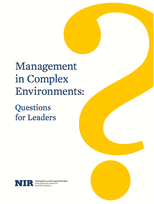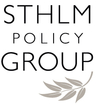Book release - Management in Complex Environments: Questions for Leaders Nov 09
Sthlm Policy Group · Comments: 0
A year long book project on business and social performance of companies operating in fragile contexts was presented in November 2013 at the Swedish Ministry for Foreign Affairs' CSR-event held in collaboration with the International Council of Swedish Industry. The book represents conversations with more than 100 company managers from more than three dozen companies. It presents questions for leaders that can guide more thoughtful and rigorous strategies for businesses operating in complex environments.
The book can be downloaded here.
The new book suggests inquiries that allow managers both to mitigate risks and create new opportunities in complex environments. It demonstrates through the practical examples of successful company leaders why asking and answering questions helps managers meet a company’s full range of goals – technical, financial, legal, reputation and social – in challenging business markets. In doing so it aspires to support new leaders as they work to achieve their own successes for their companies as well as the societies in which they do business.
The book emphasizes questions because complex markets are not only different from their more stable counterparts. They are different from each other in their challenges and opportunities. Each market may be complex, but it is differently complex. No approach – no matter how well it works in one place – can be simply imported to the others. Best practice is therefore not a particular strategy, system, or process. Best practice is to understand with great nuance each environment and the company’s place within it. For this it is imperative to lead with questions.
The book prioritizes questions to acknowledge the value of traditional management approaches with which leaders may already be intimately familiar. SWOT (strengths, weaknesses, opportunities, threats) analyses, risk frameworks, systems analyses, root cause analyses, force field analyses – these all have as much a place in complex markets as they do in more stable ones. What may well be different is the nature of the questions needed to populate such management tools and frameworks. Once supplied with the insights, answers to these questions unveil. Our experience is that seasoned managers can, for example, introduce scenarios into the company’s strategic plan describing dynamics that could lead to further instability and conflict. They can identify approaches that better support much needed stability. Leaders are able to review operating plans of each company department – human resources, procurement, labour relations, plant operations, community relations, and so on – with an eye to how they help shape a positive operating environment or mitigate risk factors that the company cannot effectively influence.
The focus on questions emphasizes that the problem may not be that traditional tools of management do not apply in complex environments, but that they are not applied with sufficient rigor. The book additionally privileges questions because of the growing recognition that companies in complex environments must partner with others. Asking questions about the complexities of the environment and the company’s role within it first of all sensitizes leaders to the perspectives, aspirations, fears and constraints of others. This makes it more likely that an attractive invitation to joint action can be extended. Asking questions then reminds leaders that coming to the table with a firm proposal or preferred solution is antithetical to true partnership. Collaborative information gathering, analysis, planning, decision-making, implementation and monitoring and evaluation require listening and learning. They are nurtured by wise and open questions.
Stockholm Policy Group was one of six co-authors of the book in collaboration with: the Corporate Engagement and Reflecting on Peace Practice Programs at CDA in the United States; Geneva Peacebuilding Platform in Switzerland; Institute for Business in the Global Context of the Fletcher School at Tufts University in the United States; and IRENE Institute of the ESSEC Business School in France. Brian Ganson is the editor and research director of the book. He resides at the Africa Centre for Dispute Settlement at University of Stellenbosch Business School in South Africa, and is a Senior Fellow with the Center for Emerging Market Enterprises of The Fletcher School, Tufts University. Brian is also a senior consultant and adviser to Stockholm Policy Group.
The book project was managed by the International Council of Swedish Industry and financed by Sida.

Comments: 0